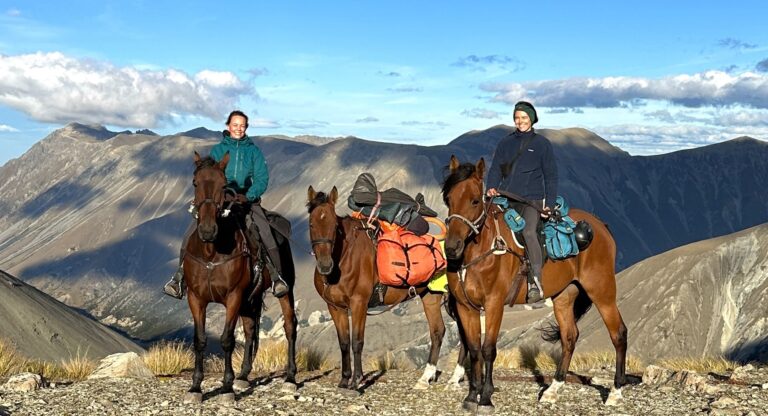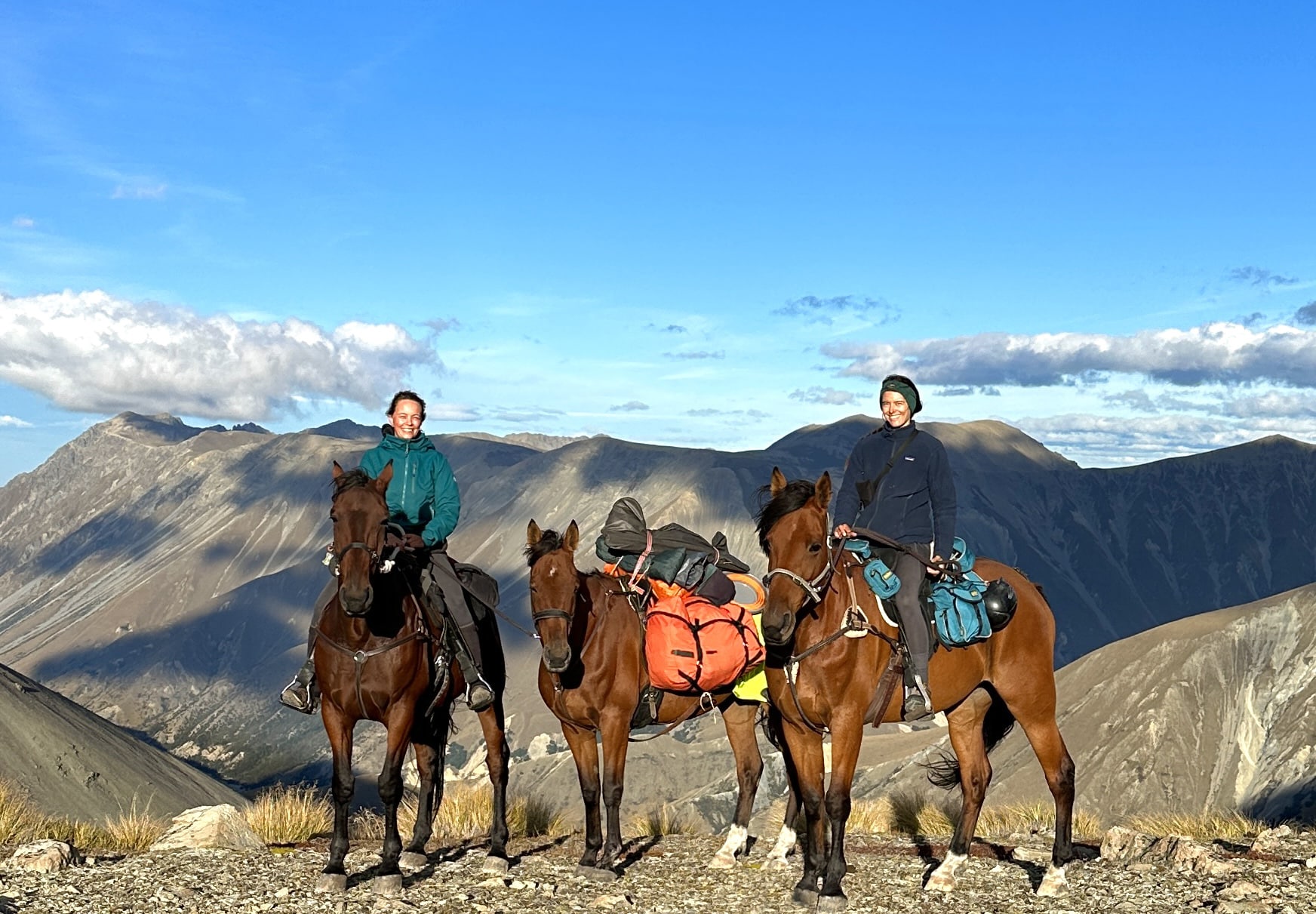
A long and winding road
Two friends decided to set out an epic journey on horseback. How did it turn out and what did they learn along the way? AMANDA MAC has the details.
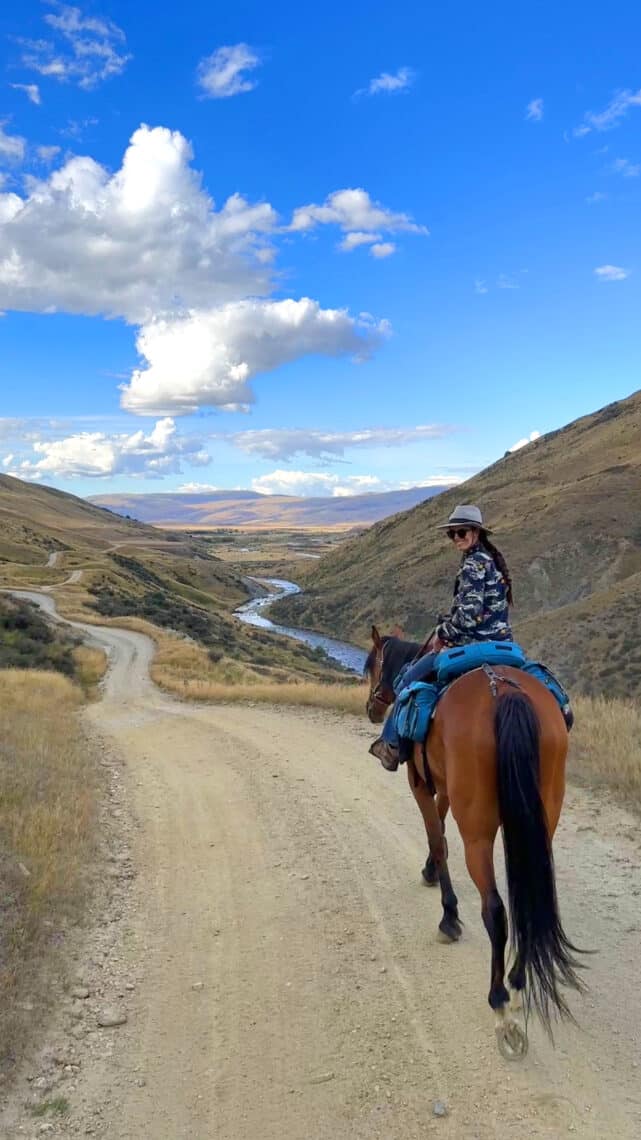
Would you be prepared to step right out of your comfort zone in return for the experience of a lifetime? It’s a big ask that might appeal to some, but not quite so much to others. However, for Karolin van Onna and Nicole Kumpfmueller, the opportunity for an adventure ultimately proved irresistible.
Karolin, who has been riding since she was seven years old, owns and operates Golden Hills Horse Treks. Located in Cromwell, some 60 kilometres from Queenstown in New Zealand’s picturesque South Island, she, along with her team of nine horses, offers guided treks through Central Otago’s impressive hill country.
An adventurer at heart, she had for many years contemplated the idea of undertaking an extended trip on horseback. “Exploring countries in that way has always been my dream, and it was my goal to one day be able to do that,” she explains.
Meanwhile, although Nicole has never owned a horse, when younger she had riding lessons for some years and was always the one who wanted to go riding whenever she and her family went on holiday together. Now living in Brisbane, she is a specialist rope access supervisor and technician, and thinks nothing of high-rise abseiling as she works on the outside of the city’s tallest buildings. Her long-time love of horses and adventure made her the perfect candidate for an epic trek along the approximately 1,000 kilometre length of New Zealand’s South Island.
The two women, both originally from Germany, met in New Zealand six years ago when Nicole was working in hospitality at a business almost next door to Karolin’s horse trekking premises. They quickly became good friends and often went riding together.
When Karolin told Nicole about her dreams of an extended trek on horseback, Nicole jumped at the idea. Initially it was a bit of a running joke between the two of them – but then the project gained serious traction. “We motivated each other throughout the time when we were planning it, but it did take a while to make it a reality. And obviously we decided on New Zealand because that’s where my horses are,” Karolin says.
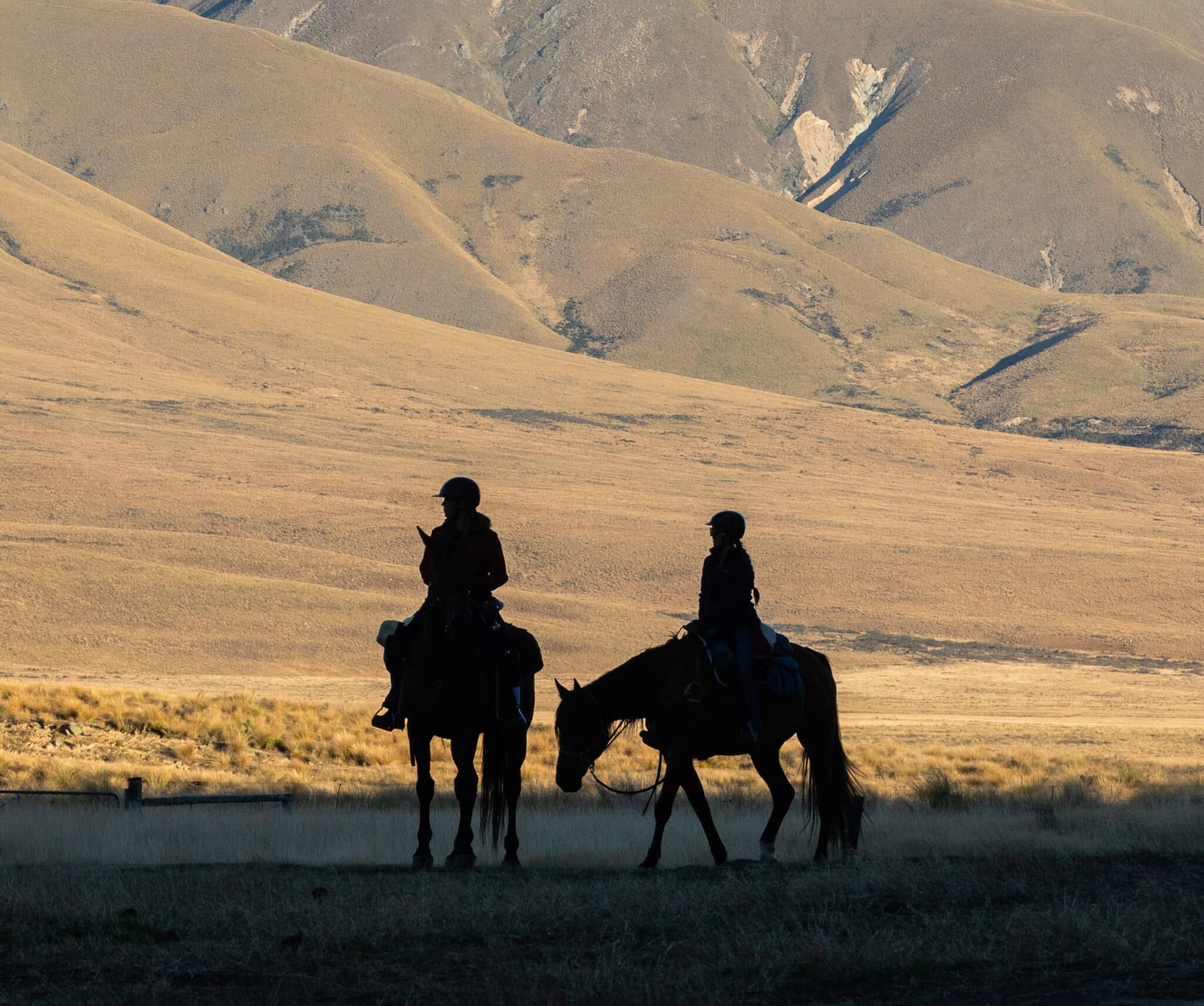
With Nicole living in Brisbane, the planning phase was at times long distance, but almost every year she flew back to New Zealand to touch base with Karolin. They researched the experiences of other riders who’d undertaken long distance treks to get some idea of what to expect, and compiled lists of equipment, clothing and food for both themselves and the horses. “There was so much involved with the logistics and background planning,” Nicole recalls, “and it was all self-organised, so it really was massive.”
And expensive too! Besides the purchase of supplies and equipment, including tents and sleeping bags, there was fuel for the support vehicle, the loss of income due to a four-month leave of absence from work and the closure of the trekking business, plus rent to pay while they were away. It was an adventure that they had to save for but it was, Karolin remarks, “absolutely worth it.”
Critical to the venture’s success was choosing which of Karolin’s horses to take. That, she says, was relatively easy: “I’ve had Moose, Rasta and Alex with me since starting my trekking business. They’re the best in the backcountry, sure footed, brave, and willing, and they get on well with each other. They also respect fence tape, which was a major thing. We didn’t want to lose them, so knowing they’d stay behind the tape we put up every night was important.”
Although Karolin’s horses are normally barefoot, she decided that they should be shod for the trek: “There was going to be a lot of rocky terrain, lots of river crossings, and gravel roads. We had them shod just before we left, then once again about half way through the ride. We took nails and a hammer with us in case we needed to put a shoe back on, but the farriers did a great job and it wasn’t necessary.”
They had decided to travel through the summer months and by early 2023, were ready to set off. Karolin’s sister arrived from Germany to take care of the remaining six horses, and Nicole flew over from Australia with her partner Sam, who had agreed to drive the support vehicle.
On the 14th of February, they left Bluff, a small town nestled on the coastline of one of the South Island’s most southerly points, for an epic three-and-a-half-month journey of some 1,500 kilometres – the additional 500 kilometres the result of finding alternative routes around steep mountains, marshland and other obstacles. “If you look at a map of the South Island, we basically rode straight through the middle up to the ocean at Picton,” Nicole explains. “There was not much backcountry at the start, so we were mostly on roads. But from then on, we rode over the shoulders of mountains and through a lot of privately owned stations. We had to ask for permission, and went from station to station. The property owners were really helpful; we’d ask if we could ride through their property, and they’d get in touch with their neighbours and ask on our behalf. So we were able to avoid roads for a lot of the way.”
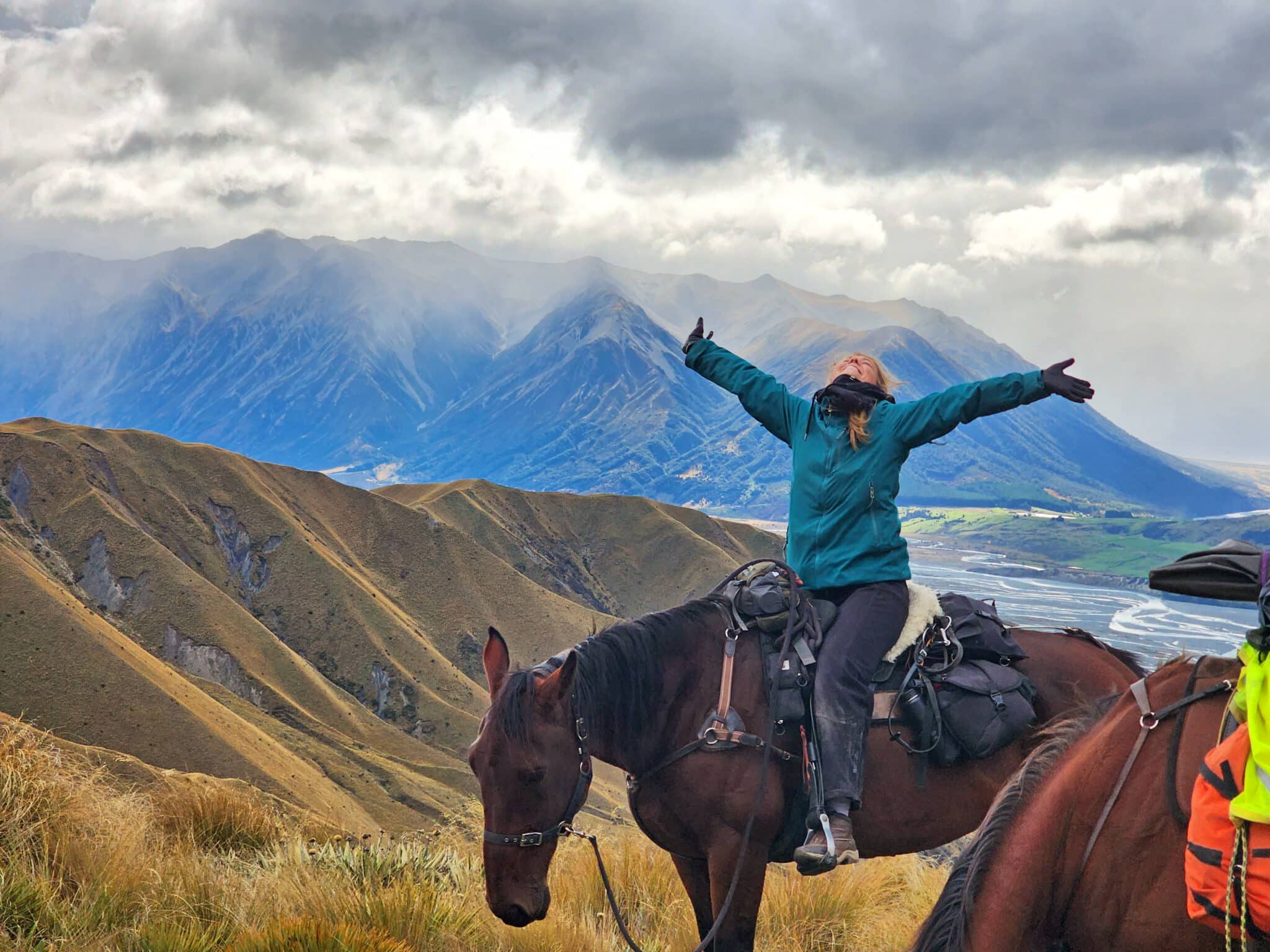
However, there were more than a few challenges. For example, on many backcountry stations, mustering is done on horseback by riders who are prepared to take the kind of risks with their horses that Karolin and Nicole were not, so asking which was the safest track didn’t always have the desired outcome. Then there were the downright scary moments when one of the horses lost their footing and fell, and, thanks to an unusually wet summer, when they found themselves bogged in unexpectedly swampy ground, something that was a particular worry for Karolin.
Travelling through backcountry where there were no tracks to follow sometimes required hours spent finding safe passage, particularly when riding over terrain at altitudes of 2,000 metres with snow still laying in patches on the ground; while dangerous river crossings, including one that, to avoid becoming stranded, had to be made as night fell, left the women wet, shivering and exhausted. “The river crossings in general were really my biggest concern. The horses were in water up to their chests in some of the rivers, and the currents were pretty strong,” Nicole recalls.
This journey was anything but a walk in the park. It was challenging both physically and mentally, and getting through the tough moments was helped by their strong friendship. “We were by ourselves for such a large portion of the time,” Nicole says, “and we relied on each other for support when one of us had a meltdown because of difficult things that happened. We always had to find the solutions.” Also essential, for their own wellbeing and that of their horses, were regular multiple day rest breaks along the way, plus meeting up with Sam and the all-important support vehicle to restock their supplies.
But then there were the rewards: “The country was incredibly beautiful, and it was amazing to see it at such a slow pace. It’s just so different to any other way of travelling,” Karolin tells me. “Then the people we met, they were also incredible. They were so helpful and welcoming to us, often giving us a bed and food.”
Also rewarding, she says, are the feelings of empowerment at successfully completing such a huge undertaking, something with which Nicole heartily agrees:
“We learned so much and I’m so proud of us that we managed to do this and that we got through it all. And it’s crazy to think that we did it by ourselves. We didn’t even have a satellite phone!”
And when the dust has finally settled and this adventure is a distant but enticing memory, is there a chance that they’ll do it all again? I guess we’ll just have to wait and see.
You can learn more about Karolin and Nicole’s epic journey on Instagram.

